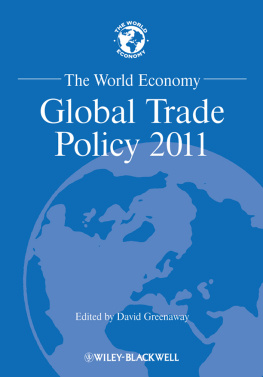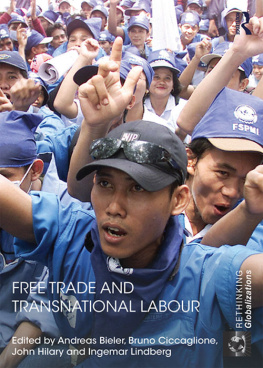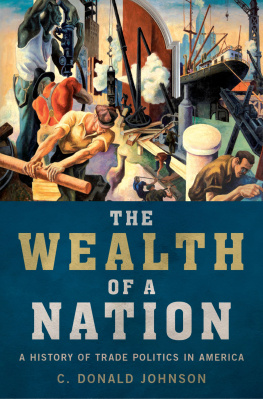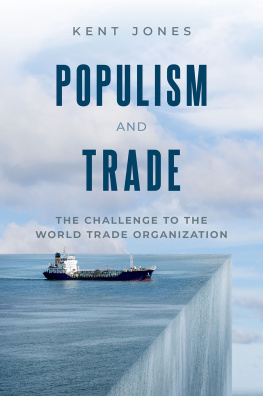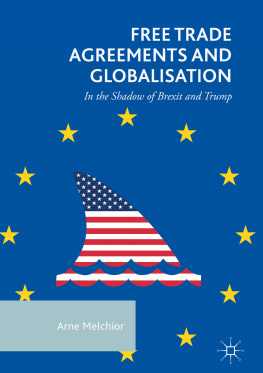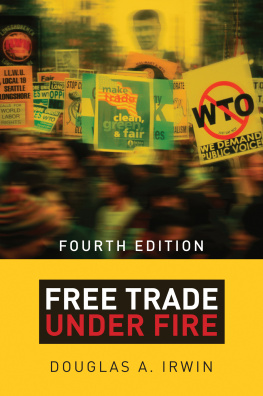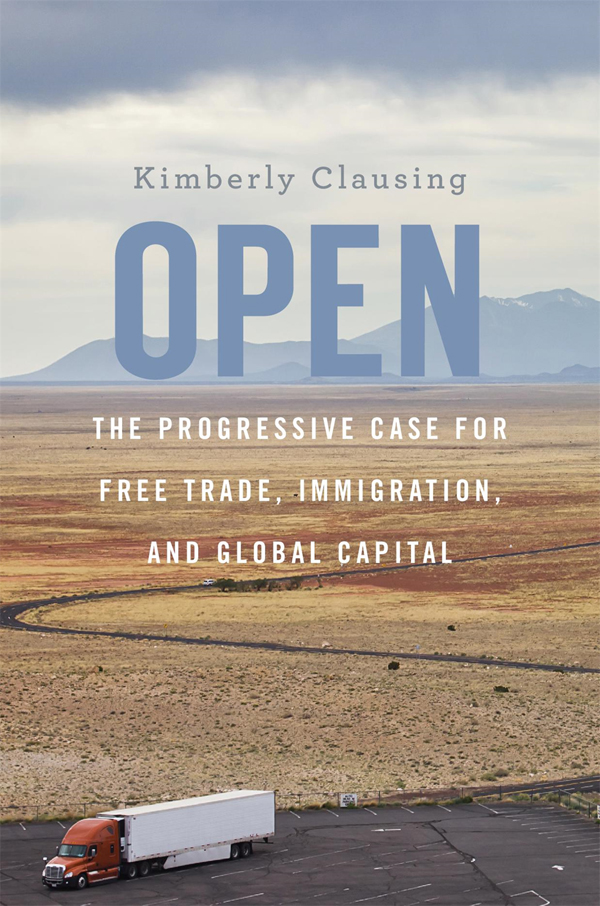978-0-674-91933-4 (alk. paper)
Names: Clausing, Kimberly A., author.
Title: Open : the progressive case for free trade, immigration, and global capital / Kimberly Clausing.
Description: Cambridge, Massachusetts : Harvard University Press, 2019. | Includes bibliographical references and index.
Subjects: LCSH: Free tradeUnited States. | GlobalizationEconomic aspectsUnited States. | EmployeesUnited States. | United StatesCommerce.
Classification: LCC HF1713 .C59 2019 | DDC 330.973dc23 LC record available at https://lccn.loc.gov/2018033462
In January 2017, Donald J. Trump was sworn in as president of the United States. His election reflected a tide of populist dissatisfaction with economic stagnation, and the perceived threats of globalization and immigration, although of course there were other factors at work in his victory.
In his inaugural address, Trump acknowledged popular discontent with globalization explicitly and repeatedly. One excerpt:
From this day forward, its going to be only America first. America first. Every decision on trade, on taxes, on immigration, on foreign affairs will be made to benefit American workers and American families. We must protect our borders from the ravages of other countries making our products, stealing our companies and destroying our jobs. Protection will lead to great prosperity and strength.
Despite his harsh rhetoric, Trumps diagnosis and policy solutions are attractive to many Americans, including some on the left. And these nationalist sentiments are not a uniquely American phenomenon; backlashes against globalization have intensified in many other countries, from both the right and left ends of the political spectrum.
This book defends global economic integration, arguing from a perspective that consistently prioritizes the needs of American workers. The substantial challenges of middle-class economic stagnation and increasing income inequality require bold, serious policy responses. But they dont require a retreat from globalization.
The plight of the American worker is very real. For decades, economic inequality has increased, and the vast majority of income growth in our economy has ended up in very few hands. Median wages have grown very slowly and, for the first time in generations, American children can no longer reasonably expect standards of living higher than those of their parents.
At the same time, the importance of capital and corporate profits in the economy has surged; since 2000, corporate profits are 50 percent higher as a share of national income than they were in previous decades, and the share of national income accruing to workers as wages has fallen steadily.
These changes have been systematic, they have happened over decades, and they are large. Indeed, these are the most pressing economic problems of modern-day America. However, knee-jerk solutions to these problems risk making matters worse, harming the very people they claim to help, hurting the future potential of the economy, and weakening our international relations and our capacity to respond to policy challenges.
Blaming foreigners (whether trading partners or immigrants) implies quick and easy solutions to our economic problems. With more restrictive immigration laws, tighter borders, tariff barriers, tough negotiating with our trading partners, and tough talks with our own companies, we are promised a return to the halcyon days of yore: a time when the American dream was alive and well, economic growth benefited all, and children grew up to earn more than their parents.
As politically palatable as these quick-and-easy solutions may be, they are dangerous and wrongheaded, more likely to hurt the very people who voted for them than to return us all to easier times. For example, tariffs on foreign products will make the foreign goods we buy at the store more expensive, harming our purchasing power as consumers. While tariffs advantage domestic companies over foreign ones, any resources that move into producing goods that would otherwise have been imported have to come from somewhere. Other sectors of the economy will contract. This will subject the labor market to more shocks, as industries that produce the formerly imported goods expand, while other industries contract.
While there will be more demand for labor at companies that make the goods that were previously imported, tariffs will not remove the incentive to innovate and mechanize to make production more efficient. Indeed, technological progress is a larger threat to American workers than foreign trade is. Almost every study comparing the two forces argues that technological change has had the more dominant influence on US labor markets.
So should we instead rally against our computers? Perhaps so. If we simply discarded our computers, dumping them into the harbor like so much imperial tea, that would generate a great deal of demand for labor throughout the US economy. We would need labor to do all those things computers used to do more efficiently: computations, filing, data entry, and consumer interactions of all sorts, from booking travel to selling clothes to trading financial assets. Of course, giving up computers would put us at a tremendous disadvantage relative to workers and consumers in other countries who had access to these technologies. Forsaking technology would also generate huge shocks to the economy, as those industries that relied on computers for their production processes would be harmed, and those workers who used computers to be more productive would see their productivity decline. Further, people really enjoy all the modern conveniences that computers provide; they would not easily give up their smartphones, movie streaming, computer games, and online shoppingor even their less frivolous work efficiency.
Yet turning to trade protectionism, and reducing immigration, generates shocks that are quite analogous to the shocks associated with giving up technological progress. Thirty percent tariffs would make almost every item at Gap or Walmart 30 percent more expensive. Steel tariffs harm workers in industries using steel as an input, such as construction. Retaliation from trading partners hurts workers making US exports. Restrictive immigration policies harm the technological leads of our companies, and fewer immigrants mean fewer entrepreneurs in Silicon Valley and beyond. Withdrawing from trade agreements and negotiating tougher terms with our partners gives us fewer friends and weaker allies, making battles against terrorism and climate change more difficult. Reducing the mutual economic interests that link China and the United States makes it more likely that small disagreements transform into broader conflict.


